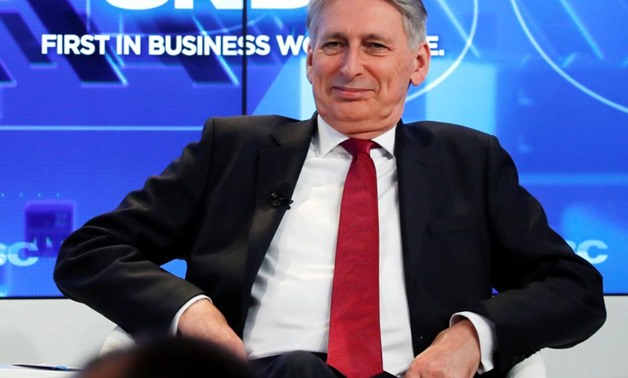
Britain's Chancellor of the Exchequer Philip Hammond attends the World Economic Forum (WEF) annual meeting in Davos, Switzerland January 25, 2018.
DAVOS - 26 January 2018: Britain's finance minister called for a modest Brexit on Thursday that would keep the world's sixth-largest economy as closely aligned as possible with the European Union after its 2019 exit.
Britain is due to exit the EU on March 29, 2019, but there are deep divisions inside Prime Minister Theresa May's government and party about what sort of relationship should replace 46 years of membership.
Philip Hammond, who in the 2016 referendum voted to stay in the EU, sought to allay investor concerns over Brexit turmoil by calling for arrangements that would ensure free and smooth trade and for the "closest possible future relationship".
"We are taking two completely interconnected and aligned economies with high levels of trade between them, and selectively, moving them, hopefully very modestly, apart," Hammond said at the World Economic Forum in Davos.
The EU and Britain agreed last month to move Brexit talks onto trade and a transition pact but some of the EU's most powerful leaders have cautioned that the final year of divorce negotiations before Britain’s exit could be fraught with peril.
The outcome of the negotiations will shape the future of Britain's $2.7 trillion economy, and determine whether London can keep its place as the only global financial centre to rival New York.
May's finance chief said that hurting London's financial centre would push business to New York and Singapore to the detriment of Europe as a whole, and he called for a bespoke trade deal with the EU.
Brexit is cast by supporters and opponents alike as the most significant shift in British policy since World War Two.
A source in May's office rebuked Hammond, saying the changes that Britain will undergo cannot be described as "very modest".
Hammond later attempted to clarify his remarks saying he was clear Britain would be leaving the EU's customs union and single market next year.
"It's a fact our economies are integrated, that's the baseline from which we leave the single market and customs union – which clearly represents change," he said on Twitter.
BREXIT TRANSITION
Supporters of Brexit say that warnings of economic chaos are overblown and that Britain will eventually prosper once it leaves what they portray as a decaying, German-dominated experiment in European integration.
Some of May's Brexit-supporting lawmakers, such as Jacob Rees-Mogg, said Britain's government must start promoting the opportunities from leaving the European Union and its negotiators should stop being "cowed by the EU".
In an effort to avoid a Brexit shock that could sow chaos through financial markets, halt trade and disrupt supply chains across Europe, Britain wants a transition deal agreed by the end of March that would roll for about two years after exit.
Under current plans, Britain will remain an EU member in everything but name but will have no representation in EU decision-making bodies. Britain would remain part of the EU's customs union and internal market and be bound by EU laws.
Hammond said, "A transition period which allows us to continue under the present rules where everybody understands those rules gives us time to do this in an orderly fashion and gives us time to address some of the financial stability challenges."
But opponents of Brexit say there is little clarity on where Britain is transitioning to and hope to force a halt to the divorce, a prospect Hammond dismissed.
"This decision is not going to be reversed. That is a matter of political reality," he said.
In Brussels, EU diplomats said the bloc is willing to be flexible on the duration and other terms of a Brexit transition period as Britain prepares to detail its hopes for what happens after it leaves the bloc.
Some businesses, and many international banks in London, are concerned that either the detail of any transition deal could be lacking or that any deal could collapse due to domestic political upheaval in the months before Britain exits.
"It's all or nothing," said a senior executive at one of the largest banks in London. "They can't even give us political certainty, let alone legal certainty until much, much later in the process."


Comments
Leave a Comment